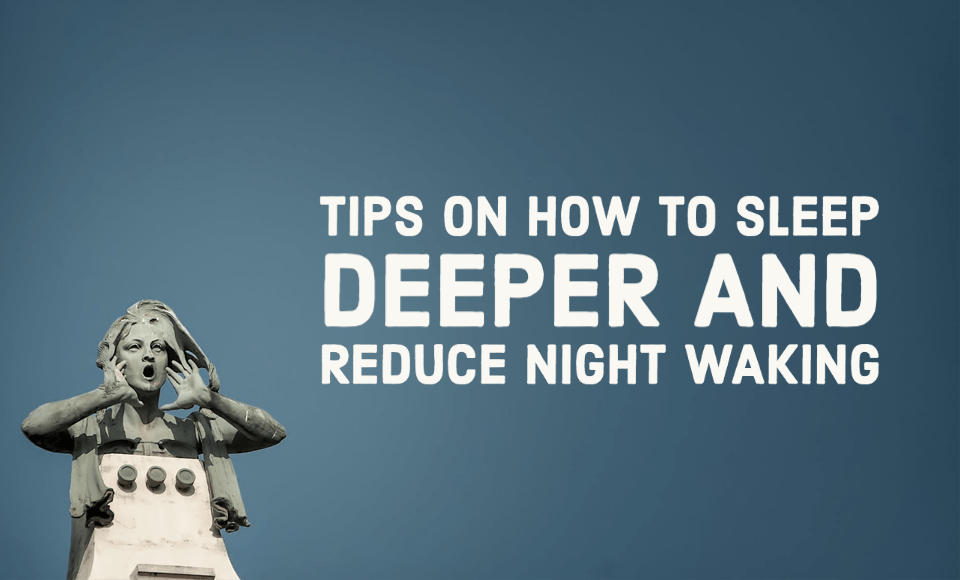For many adults, a good night’s sleep seems like a luxury. Whether you have trouble falling asleep, wake repeatedly in the night, or never wake up feeling refreshed, there are several solutions to improve your sleep quality.
Diet
It is well-known that limiting your caffeine during the day will help you fall asleep more easily at night. Simply avoiding caffeine later in the day is not enough to make a difference in your sleep quality. It is necessary to limit your total consumption of coffee, tea, chocolate, soda, and energy drinks to an absolute minimum. From John’s Hopkins University School of Medicine, “Caffeine administered immediately prior to bedtime or throughout the day has been shown to delay sleep onset, reduce total sleep time, alter the normal stages of sleep, and decrease the reported quality of sleep.” Once you start sleeping better, your body will not need the caffeine to stay awake during the day. Caffeine withdrawal symptoms will likely plague you for a matter of days once you detox from your daily intake. Caffeinedependence.org suggests reducing your intake by a very small dose, perhaps half a cup of coffee per day, to decrease the severity of the symptoms at first.
Limiting your sugar intake will also increase your sleep quality. According to Doctor Murray, eating sweets triggers the “fight or flight” response in the body. Calming an alert body is quite a challenge to overcome at bedtime, so avoiding sugary foods throughout the day can ease the transition from wakefulness to sleep. If you are suffering from a sugar addiction, which has been researched to be a more real addiction than previously thought, then you may need some extra help in kicking the sweets habit. Books such as Connie Bennett’s “Sugar Shock!” and Kathleen DesMaisons’ “The Sugar Addicts Total Recovery Program” are a good place to begin.
Exercise
Although your body is fatigued from lack of a good night’s sleep, it is not properly tired from physical exertion, so it will be a challenge for you to fall asleep after a day of not exercising. Physical movement brings oxygen to the tissues in the body and allows them to “breathe” and rejuvenate. Being mentally tired from a long and stressful day may make you want to sleep, but your body will not be convinced unless you are physically tired as well. A study published by the American Psychological Association showed a positive relationship between exercise and the amount of slow-wave sleep in an individual. Slow-wave is the deepest type of sleep from which it is very difficult to be awoken. So, the more you exercise, the better you sleep.
Routine
Having a bedtime may make you feel like a child, but routines and bedtimes greatly benefit adults. Set a nightly bedtime and wake up time that allows you to sleep approximately 8 hours per night. Scheduling yourself 8 hours is the first step in actually sleeping 8 hours. Sticking to your same schedule even on holidays and weekends will enhance the quality of your sleep as well. Performing a short nightly routine before bed each night will help your body to realize it is bedtime and can also help you sleep better in new or strange places.
Reduce Stress
The emotions you feel before you fall asleep stay with you throughout the night and can affect the quality of your sleep. If you are scared, angry, or over-excited you may wake more fully during lighter phases of sleep than if you are calm and relaxed before going to bed.
Try to reduce your body’s stress before bed by limiting stimulation. Meditate, practice deep breathing, or simply listen to calming music late in the evening. Mayo Clinic promotes massage as a stress relief as well as yoga. All of these methods inadvertently teach you how to discipline and focus your mind as you block out mental stressors.
Environment
Your sleeping environment should be dark, peaceful, and a comfortable temperature. Your bedding should be clean and most importantly, your pillow should be comfortable. Open your bedroom windows for a short time each day to oxygenate the room and keep it from becoming too stuffy. Plants also oxygenate a room while removing air pollutants. Researchers from UCSD found that increasing the level of oxygen in a room for individuals at high altitude made a significant difference in their sleep quality.
Improving your sleep quality is a completely attainable goal when following these tips for a better night’s sleep. Whether you need to break caffeine and sugar habits, increase your physical activity, make your routine predictable, discipline your mind or enhance your bedroom, a solution exists for your nighttime problem.
References:
Mayo Clinic Staff, “10 Tips for Better Sleep”, Mayo Clinic
Doctor Murray, “Insomnia & Sleep-wake cycle disorder”, Doctormurray.com
Baekeland et al., “Exercise and Sleep Patterns in College Athletes”, APA PsychNet
John’s Hopkins, “Information About Caffeine Dependence”, caffeinedependence.org
Luks et al. UCSD, “Room oxygen enrichment improves sleep and subsequent day-time performance at high-altitude”, pubmed.gov

